 FILM
FILM « In Which Roman Polanski Gives Tess A Certain Romantic Weight »
 Wednesday, September 28, 2011 at 11:23AM
Wednesday, September 28, 2011 at 11:23AM This week we look back at the films of Roman Polanski.
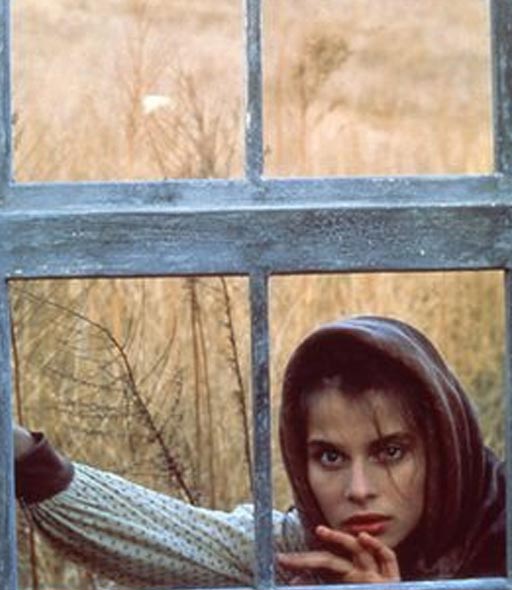
A Woman Revealed
by KARA VANDERBIJL
Tess
dir. Roman Polanski
186 minutes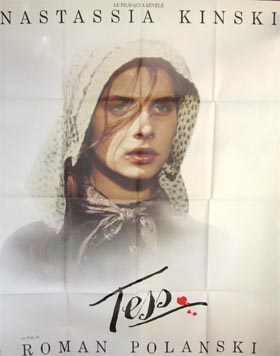
Polanski filmed Tess in France, a fugitive. Wanted in the United States for sexual assault and fearing extradition if he remained in England, he fled to a rural slice of territory in Brittany. Where else could such a man have found refuge? What other story could he have brought to life? Shortly before her murder by the Manson family in 1969, Polanski’s wife Sharon Tate had sent him a copy of it along with a note: “This would make a great film.” She had no idea.
Tess Durbeyfield (Nastassja Kinski), the daughter of uneducated farmers, must go claim kinship with a wealthy distant cousin when a parson idly tells her father that he is not, in fact, simply John Durbeyfield but rather the last of a defunct noble family, the d’Urbervilles. The Durbeyfield’s horse has died and they face certain desperation, so Tess reluctantly accepts a position at the d’Urberville manor as a poultry maid, although it becomes clear soon enough that “cousins” Lady d’Urberville and her son Alec (Leigh Lawson) are not true relations, having bought the title. Alec’s immediate infatuation with her both fascinates and repulses her, but when he rapes her one foggy evening in the forest she can dream of nothing but escaping him. Pregnant and by all societal standards shamed, she returns home where she gives birth to a sickly infant that does not survive.
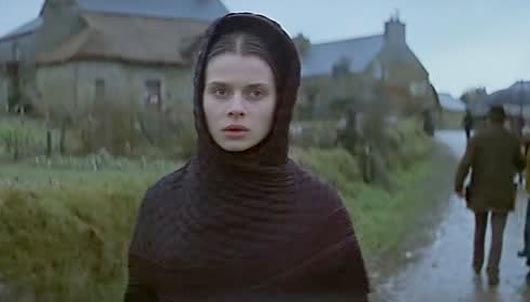
French posters for the film promised enticingly, “The film that revealed Nastassja Kinski!” While entire sequences revolve around her mouth — its innocent fullness, the way the lips tremble at the slightest emotion — the promise is almost entirely ironic. The sixteen-year-old German had already gained notoriety by appearing nude in a previous film (Sykes’ To The Devil…A Daughter, released in 1976), and in Tess barely reveals more than a demure breast to feed a squalling child.
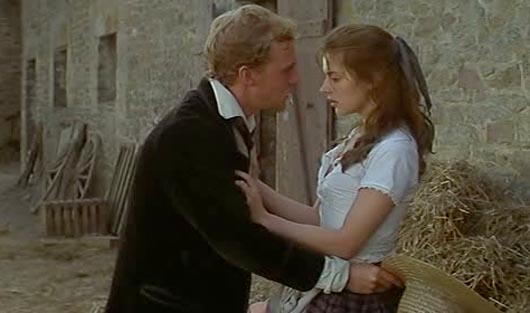
Yet the memory alone of such startling young womanhood — an eager body — lends to the story a heroine that has not reappeared in any subsequent adaptations of Hardy’s novel. She is a woman of cunning naivete who is still no more than a girl, a woman one wants to blame for one’s sin, a “pure woman faithfully presented.” One can detect Kinski subtly blooming in this role, which would award her with worldwide recognition.
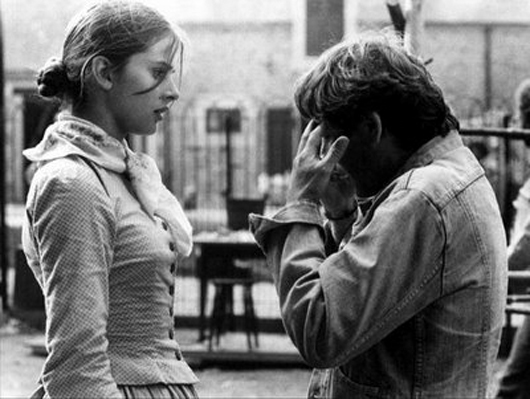
Similarly, one can sense Polanski’s fumbling attempts to discover his ingénue, a manic search that might have led to the sudden intimacy between himself and Kinski, despite the fact that he was almost three times her age and convicted of a similar offense across the puddle.
What is it in a man that longs to discover a woman? When Tess leaves home once again, some time later, she begins working for a kindly dairy farmer — and it is in these idyllic pastures that she meets Angel Clare (Peter Firth), an aspiring young farmer attracted to what he considers to be her singular purity and her natural, unspoiled femininity. Since Tess believes herself to be forever tainted, she struggles against her growing affection. Determined to begin anew she attempts to tell Angel what happened between her and Alec by shoving a note under his door, an almost passive-aggressive gesture begging for trouble.
The most spectacular moment in the film captures Tess as she finds the note, unread, untouched, on their wedding day; the brilliant sun obscures her from our vision as she descends the barn ladder, her face one moment the picture of ecstasy and the next, unbearable pain. Her next chance comes at supper, and she tells Angel, trembling, of the night she was victimized. The fire burns low as she stares into it. Blurred in the background, you can almost feel the cold radiating off of Angel.
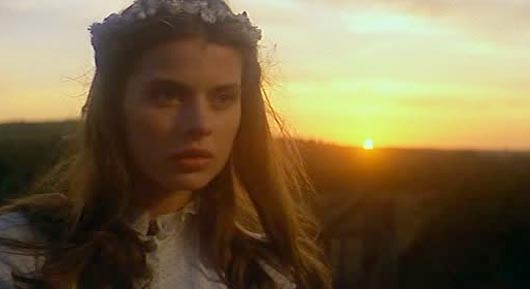
Turn Tess into a tale of sentimentality and a certain romantic weight must be given to the male leads, a mistake Polanski gracefully avoids. Neither Leigh Lawson nor Peter Firth makes any lasting impression opposite Kinski. It’s easy to hate Alec, but it is not as simple to fall in love with Angel. What was initially intended to be jarring — the moment when Angel turns his face from Tess and tells her that he can no longer love her — becomes almost irrelevant; we cannot wait to see Kinski’s lips take the news. We might have done worse just to see this woman react.
Disillusioned, Angel insists that she return home to her parents while he goes on an exploration of South America alone. Thus abandoned, Tess searches for work so as to support her ailing father and hungry family, and somehow manages to run into Alec. England was never so small as when it rested in the lens of Polanski’s camera.
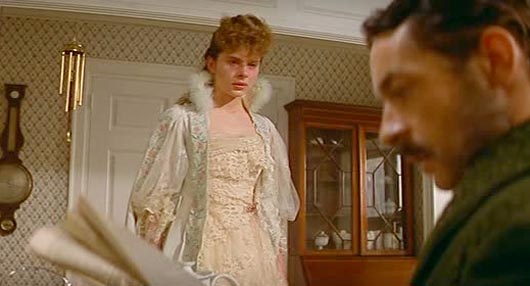
Alec’s manipulative attempts to win her back disgust Tess, but when her father’s death pushes the Durbeyfields into abject poverty, she desperately secures Alec’s financial help by becoming his mistress — just when Angel returns to beg her forgiveness. Strangely enough, their reunion is anticlimactic; I might blame the unconvincing passion between them on botched chemistry.
Even when they have finally escaped Alec and roll around like feral children on the floor of an unoccupied house, we cannot believe in them. Neither does Tess, apparently, since she allows herself to be captured by the police roughly 48 hours after murdering Alec.
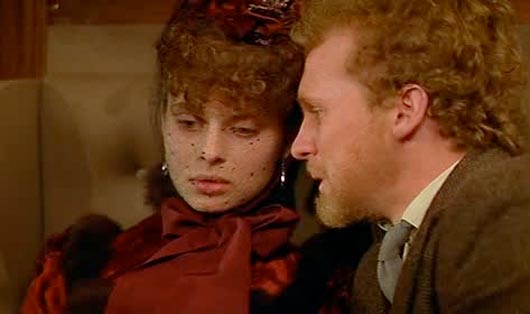
In Polanski’s vision, key conflicts take place outdoors, their outcome as foggy as the landscape; tents, however, represent a stalemate, a meeting of two equally determined forces. Thus Tess meets Alec for the first time in his pleasure pavilion on the lawn of Lady d’Urberville’s manor, while later on the impoverished Durbeyfields take shelter in a churchyard behind the fluttering curtains of Mrs. Durbeyfield’s four-post bed. In this world a group of young women frolicking in the fields to celebrate May Day with flowers and dancing is as solemn as a funeral procession, and a dank crypt offers comfort.
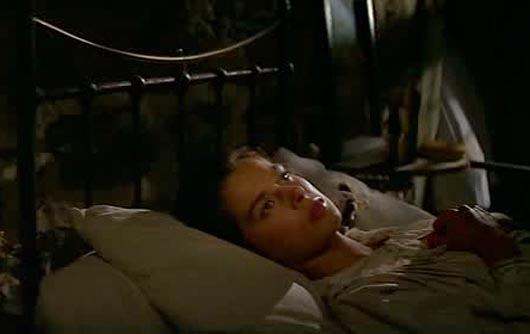
Here, the odds are equal for destruction and restoration, and often one will not take precedence without inciting the other. Safety is rarely found indoors. Violence, but also an uneasy sort of love, originates in forests and on plains. Tess observes a noble hunting party chasing through the mist, an illusion nowhere near as haunting as her own experiences.
There is nothing more difficult than making an old story new, because there is nothing as untrue as the assumption that good stories remain relevant forever. You must find a fresh face to play ancient vices and virtues as if they have never been played before. Most of the time, though, all it takes is the experience of stigma to understand a classic. That Polanski saw himself in the heroine, shunned by society and struggling to regain her virtue, is certain. Could it have been any other way? Could it have been any other woman?
Kara VanderBijl is the senior contributor to This Recording. She is a writer living in Chicago. She last wrote in these pages about Abi Morgan’s drama The Hour. You can find her website here.
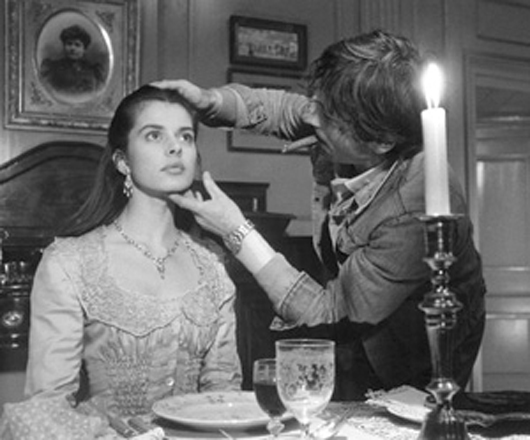
"To Be Continued" - Evidence (mp3)
"Crash" - Evidence (mp3)
"It Wasn't Me" - Evidence (mp3)
The second studio album from Evidence, entitled Cats & Dogs, was released on September 27th.
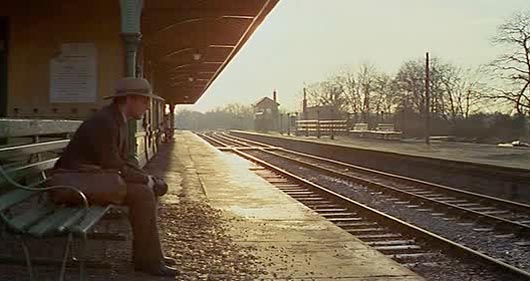
 kara vanderbijl,
kara vanderbijl,  roman polanski,
roman polanski,  tess
tess 





























Reader Comments (1)